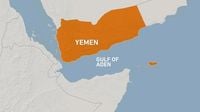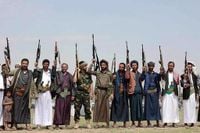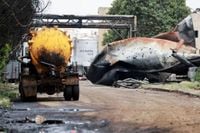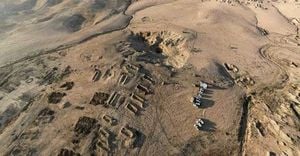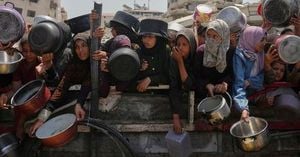On August 17, 2025, the already volatile Middle East saw another escalation as Israeli forces struck a key energy infrastructure site near Yemen’s capital, Sanaa. The target, identified by Israeli military sources as an asset used by the Iran-aligned Houthi movement, was hit in direct response to what Israel described as repeated attacks by the Houthis—including missile and drone launches—against Israeli territory. The events unfolded amid ongoing regional turmoil, with the war in Gaza casting a long shadow across borders and alliances.
According to Reuters, the Israeli military confirmed that its forces had “struck an energy infrastructure site that served the Houthi terrorist regime” deep inside Yemen, specifically in the area south of Sanaa. While the official statement did not name the site, Houthi-affiliated Al Masirah TV and local civil defense sources reported that the target was the Hezyaz (alternatively spelled Haziz) power plant, a critical facility for the region. Residents in Sanaa described hearing at least two loud explosions, and footage shared by local media showed emergency crews battling a fire sparked by the strike. Yemen’s deputy prime minister later confirmed that the blaze was contained, preventing further damage to the already fragile power infrastructure.
“An aggression targeting the Haziz power plant” was how Al Masirah TV put it, emphasizing the civilian nature of the site and raising concerns over the legality and proportionality of the attack. Israeli military sources, for their part, maintained that the facility was being used by Houthi fighters as part of their ongoing campaign against Israel. However, as reported by Al Jazeera, no evidence was presented to substantiate the claim that the civilian power station had a military function, leading some observers to question whether the strike might constitute a war crime under international law.
The backdrop to this latest exchange is a cycle of tit-for-tat attacks that has steadily expanded since the outbreak of the Israel-Hamas war in Gaza in October 2023. The Houthis, backed by Iran and controlling much of northern Yemen, have repeatedly launched rockets and drones towards Israel, declaring their actions as acts of solidarity with the Palestinians. Most of these projectiles have been intercepted by Israeli defenses, but the persistent threat has prompted Israel to respond with air strikes on Houthi targets across Yemen, including critical infrastructure such as ports and airports.
According to Free Malaysia Today, the Israeli military stated that the August 17 strike was “conducted in response to repeated attacks” by the Houthis. Just days earlier, on August 14, Israel intercepted a missile fired from Yemen, with the Houthis quickly claiming responsibility. The group has also targeted ships linked to Israel in the Red Sea and Gulf of Aden, a move that has disrupted global trade routes and drawn in outside powers.
The conflict has not remained confined to Israel and Yemen. The United States and the United Kingdom have both conducted bombing campaigns in Yemen, primarily in response to Houthi attacks on ships associated with Israel and Western interests passing through the Red Sea. These international strikes, which began in earnest in January 2024, aimed to secure the vital waterway for global commerce. Yet, the Houthis broadened their campaign to include ships tied to the US and Britain, further complicating the already tangled web of alliances and enmities.
In May 2025, the United States announced a surprise truce with the Houthis, halting its bombing campaign in exchange for the cessation of attacks on US-linked vessels in the Red Sea. US President Donald Trump declared that the deal would “stop the bombing,” a statement that seemed to catch Israel off guard. Israeli Prime Minister Benjamin Netanyahu responded pointedly, asserting that Israel would “defend ourselves alone” if necessary. The Houthis, meanwhile, insisted that the ceasefire with the US did not extend to their operations against Israel, vowing to continue targeting Israeli ships as long as the war in Gaza persisted.
The Houthis’ position was made clear by their leadership, who reiterated their commitment to “continue targeting Israeli ships, in what they describe as support for Palestinians during the war in Gaza,” as reported by Reuters. This stance has ensured that the Red Sea and surrounding waters remain a flashpoint, with commercial shipping and humanitarian aid deliveries frequently caught in the crossfire. Israel’s bombing of Yemen’s Hodeidah port—a vital lifeline for humanitarian supplies—has further exacerbated the humanitarian crisis in Yemen, a country already suffering from years of conflict, famine, and disease.
The August 17 strike on the Hezyaz power plant is only the latest in a series of escalations that have seen civilian infrastructure repeatedly targeted on both sides. There were no immediate reports of casualties from the most recent attack, but the damage to the power plant has raised fears of further hardship for Yemeni civilians, many of whom already endure daily blackouts and fuel shortages. International observers and human rights organizations have expressed concern that such strikes, absent clear evidence of military use, risk deepening the suffering of non-combatants and violating international humanitarian law.
For Israel, the calculus remains one of deterrence and self-defense. With the Gaza war showing no sign of abating and regional actors increasingly drawn into the fray, Israeli officials have signaled a willingness to take unilateral action if allies do not provide sufficient support. The message from Prime Minister Netanyahu was unambiguous: “We will defend ourselves alone if necessary.”
For the Houthis, the struggle is framed as one of resistance and solidarity. Their campaign against Israeli and Western interests is justified, in their view, by the ongoing suffering of Palestinians in Gaza. While a truce with the US has brought a temporary halt to American airstrikes, the group’s leadership has made it clear that their campaign against Israel will continue unabated.
The broader implications of these developments are sobering. The repeated targeting of civilian infrastructure, the involvement of major world powers, and the risk of further escalation all point to a region on edge. The Red Sea, once a relatively stable corridor for global trade, has become a frontline in a wider conflict that now stretches from the Levant to the Horn of Africa. Humanitarian agencies warn that continued attacks on ports, power plants, and other critical infrastructure could push Yemen—already the site of one of the world’s worst humanitarian crises—into even deeper despair.
As the dust settles over Sanaa and emergency crews tally the damage at the Hezyaz power plant, one thing is clear: the cycle of retaliation shows no sign of ending soon. With both sides vowing to continue their campaigns and little progress towards a broader peace, the people of Yemen and the wider region remain caught in the crossfire of a conflict with no easy answers.
